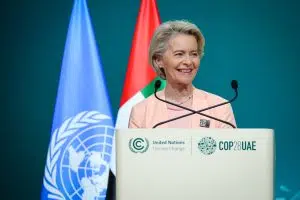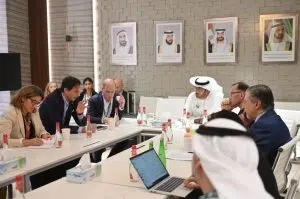Brussels – A long applause accompanied this morning’s (13 Dec.) announcement at Cop28 in Dubai that a “historic” commitment had been reached to move away from all fossil fuels in energy systems to achieve net zero emissions globally by 2050.
A day behind schedule (Cop was supposed to close yesterday), a new plenary session of the United Nations Climate Change Conference opened this morning shortly after 7 a.m. But it lasted only a few minutes. Just long enough for the Cop28 chairman, Sultan al-Jaber, to note that there were no objections from the nearly 200 countries that attended to the latest compromise text, which was the focus of frantic overnight negotiations that led to a unanimous agreement this morning.
The beginning of the end
In the final version of the agreement, there is no real reference to the words “phase-out” of fossil fuels, as the more ambitious parties, such as the European Union, were calling for. But there is an explicit call for the necessary “transition away from fossil fuels in energy systems, in a just, orderly, and equitable manner, accelerating action in this critical decade, so as to achieve net zero by 2050,” reads the final document agreed upon in Dubai.
The deal is undoubtedly historic because it is the first time in the history of the most important global appointment of climate diplomacy where there is a clear reference in the final resolution to the end of the use of gas, coal, and oil that will have to be phased out of global energy systems to achieve global neutrality.
Cop28 will be remembered for marking the beginning of this process, that is, the beginning of the end for fossil fuels. Although the job is far from done. The future role of fossil fuels was, as expected, the main and most divisive issue at Cop28, which was held in the United Arab Emirates, one of the world’s largest oil and gas producers.

After opening on Nov. 30, quickly finalizing discussions to establish a Global Fund for Climate Change Losses and Damages, negotiations between the parties soon stalled on a draft final document presented by the Emirati presidency without any reference to phasing out fossil fuels, offering the countries present a range of options to adopt. After three days of intense negotiations and general outrage at a downsized agreement, the text was revised and adopted in its final version.
Doubling and tripling, historic ‘Made in Europe’ agreement
As is always the case, international reactions to the final compromise are divided between those who describe the agreement as a breakthrough by addressing for the first time the need to bring about a fossil-fuel-free transition and those who see it as a downsized deal. The European Union falls into the former case.
Not just fossil fuels, Cop28 ends today by accepting the proposal that the European Commission promoted to launch a global commitment to renewable energy and energy efficiency, the initiative that sets global 2030 targets of tripling installed renewable energy capacity (at least 11 terawatts) and doubling energy efficiency measures (from 2 to 4 percent annually).
An initiative that the President of the European Commission launched during the first days of the meeting, with 121 countries willing to join. And it is now again Ursula von der Leyen who claims that the signatories to the pledge have risen to 130. “The world has pledged to triple renewable energy capacity and double the rate of energy efficiency improvements by 2030. This gives a strong impetus to the transition away from fossil fuels,” the German leader commented, hailing the agreement at Cop28 as a historic breakthrough for the beginning of “the post-fossil fuel era.”
The United Nations climate conference in Dubai “has just reached a historic agreement. And a crucial part of it is truly made in Europe,” she claimed in her speech in Strasbourg during the plenary session of the European Parliament. The final document also includes the request to triple global renewable energy capacity by 2030 and accelerate the development of low-emission technologies including nuclear (as claimed by French President Emmanuel Macron, a firm supporter in Europe of atomic power), low-carbon hydrogen, and carbon capture and storage.

The Commissioner for Climate Action, Wopke Hoekstra, and Spanish Minister, Teresa Ribera
“The world has just taken a historic decision to set in motion an accelerated and irreversible transition away from fossil fuels. In doing so, we have achieved what we set out to do: to keep the 1.5° target within reach and mark the beginning of the end of fossil fuels,” said European Commissioner for Climate Action, Wopke Hoekstra, commenting on the agreement from Dubai, where she is negotiating on behalf of the European Union along with the Spanish Minister for Transition, Teresa Ribera, who represents the rotating presidency of the EU Council.
Slow steps on carbon price
There was a third point the EU tried to push on in the negotiations, with no tangible results. Brussels was pushing the other partners to work together to bring to Cop28 a proposal for global carbon pricing to reflect the emissions trading scheme the EU has adopted since 2005. No dice, the time is not ripe, and acknowledging this, von der Leyen,
referred to the fact that Cop28 was also “an opportunity to discuss carbon pricing with other parties, so that more countries start putting a price on pollution,” but that no decision was made.
Brussels wants to use carbon pricing revenues to support clean transition in developing countries, so the idea would be to earmark the revenues for climate finance. The European Union introduced the emissions trading system, the ETS carbon market, in 2005, with which, according to figures unveiled by von der Leyen a couple of months ago, generated revenues of 142 billion euros and, at the same time, reduced emissions by 35 percent. Brussels believes that putting a price on carbon is one of the most effective tools for cutting emissions so that polluters are forced to pay a tax.
English version by the Translation Service of Withub





